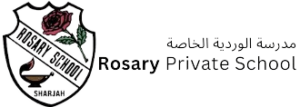ROSARY SCHOOL CURRICULUM

Our school’s vision is to prioritize raising the level of achievement of students in international and national tests.
Cambridge Primary is an international, world class education programme, typically for young learners aged 5 to 11 years and is used in primary schools around the world. It engages learners in an active and creative learning journey, building knowledge and skills and develops young learners who are confident, responsible, reflective, innovative and engaged.
Cambridge Primary develops skills in English, Mathematics and Science.
The curriculum is flexible with clear learning objectives. The curriculum framework for each subject of Cambridge Primary is organised into six stages. These stages reflect the teaching targets for each year group and provide comprehensive learning objectives.
The Arabic and Islamic curriculum follows the rigorous Ministry guidelines; Rosary School also strives to promote National Agenda and to ensure that the Emirate cultures and values are visible across the curriculum alongside a desire to celebrate all cultures within the school. At Rosary School we provide a rounded approach to education by providing Music, French, ICT to children. We are proud to announce that we Rosary School – Halwan is officially registered as a Cambridge International School.
MATHEMATICS
The curriculum frameworks for each subject for Cambridge Primary are organized into six stages. They reflect the teaching target for each year group and provide comprehensive learning objectives. For Cambridge Primary Mathematics, the curriculum is presented in five content areas or ‘strands’. These are further subdivided into ‘sub strands’.
The strands and Sub strands are:
Number
Numbers and the number system. Calculation – Mental strategies, Addition and subtraction, Multiplication and division.
Geometry
Shapes and geometric reasoning Position and movement Measure.
Measure
Money (until stage 3) Length, mass and capacity Time Area and perimeter (from stage 4).
Handling data
Organizing, categorizing and representing data
Problem solving
Using techniques and skills in solving mathematical problems Using understanding and strategies in solving problems (from stage 4)
The first four content areas are all underpinned by Problem solving, which describes using techniques and skills and the application of understanding and strategies in solving problems. Mental strategies are also a key part of the Number content . This curriculum focuses on principles, patterns, systems, functions and relationships so that learners can apply their mathematical knowledge and develop a holistic understanding of the subject.
On the following pages, you will find some examples from the Number strand and the sub strands for stages 1, 3 and 5 of the Cambridge Primary Mathematics curriculum. The Cambridge Primary Mathematics curriculum framework provides a solid foundation upon which the later stages of education can be built. Cambridge Primary offers an optional testing structure to assess learner performance and report progress for both learners and parents.
These assessments provide an international benchmark that enables teachers to identify learner strengths and weaknesses for individuals and class groups and develop further teaching and learning support using the information from the test results. Cambridge Primary Progression Tests are available to schools registered for Cambridge Primary for stages 3-6.
These tests are marked by teachers and come with full mark schemes and marking guidance. At the end of Cambridge Primary, schools can also offer Cambridge Primary Checkpoint, a diagnostic test which offers comprehensive feedback at the end of the Cambridge Primary stage.
ENGLISH
1.Phonics, spelling and vocabulary Grammar and Punctuation
2. Reading (Fiction, poetry, non-fiction)
3.Writing (Fiction, presentation and non-fiction)
4.Speaking
5.Listening
SCIENCE
BIOLOGY
Plants
Humans and animals
Living things in their environment (from stage 2)
CHEMISTRY
Material properties
Material changes (from stage 2)
States of matter (from stage 4)
PHYSICS
1.Forces (forces and motion from stage 3)
2.Light and dark (from stage 2)
3.Electricity (from stage 2, Electricity and magnetism
4.from stage 4)
5.The Earth and beyond (from stage 2)
6.Sound
ARABIC, SOCIAL & ISLAMIC STUDIES
قسم اللغة العربية التعريف
بالمنهاج تتبع مدرسة الوردية منهاج وزارة التربية والتعليم في تدريس مادة اللغة العربية وهو منهاج يراعي الأساس النفسي للطالب حيث يعتبر منهجًا لتعليم اللغة الأم, لغة الدين والمجتمع، لذلك فإن فلسفة هذا المنهج تقوم على مبادئ العقيدة الإسلامية، ودعائم المجتمع العربي الإسلامية ويعكس التضامن العربي من خلال محتواه وأما من الناحية النفسية فنجد أن منهج اللغة العربية للتعليم العام بدولة الإمارات العربية المتحدة يراعي خصائص المتعلمين في كل مرحلة تعليمية، إيمانًا بأن النمو اللغوي يتأثر بجوانب النمو الأخرى كما أن منهج اللغة العربية يؤمن بمبدأ الفروق الفردية بين المتعلمين من خلال التنوع في أنشطته واستراتيجيات تقديمه أما بالنسبة للأساس التربوي فإن منهج اللغة العربية الحالي يستفيد من النظريات التربوية في تنظيم مواقفه التعليمية والتعلمية، واختيار ما يناسب ظروف التعلم على مستوى التكامل بين فروع اللغة العربية وعلى مستوى التوازن بين المهارات اللغوية، والتدرج في المعلومات وتوظيفها من خلال الفنون اللغوية المتنوعة ويقوم على ربط التعلم بالواقع ويرى المنهج أن المتعلم هو محور التعلم
. اللغوي ويحرص المنهج على الترابط مع مناهج المواد الدراسية الأخرى. ومصادر تعلمه، وتدرجه ليراعي جميع الفئات
أما بالنسبة للأساس التربوي فإن منهج اللغة العربية الحالي يستفيد من النظريات التربوية في تنظيم مواقفه التعليمية والتعلمية، واختيار ما يناسب ظروف التعلم على مستوى التكامل بين فروع اللغة العربية وعلى مستوى التوازن بين المهارات اللغوية، والتدرج في المعلومات وتوظيفها من خلال الفنون اللغوية المتنوعة ويقوم على ربط التعلم بالواقع ويرى المنهج أن المتعلم هو محور التعلم. اللغوي ويحرص المنهج على الترابط مع مناهج المواد الدراسية الأخرى
كما ينطلق منهج اللغة العربية للتعليم العام من كونه منهجًا لتعليم أداة أساسية للتواصل بين أفراد المجتمع، وعليه فهو حريص – في هذا الصدد- على تنمية مهارات الاتصال اللغوي المناسبة للمتعلمين في كل مرحلة تعليمية، وتهيئة المعارف المرتبطة بها والأداء اللازم لإتقانها على المستويين الرسمي وغيرالرسمي
